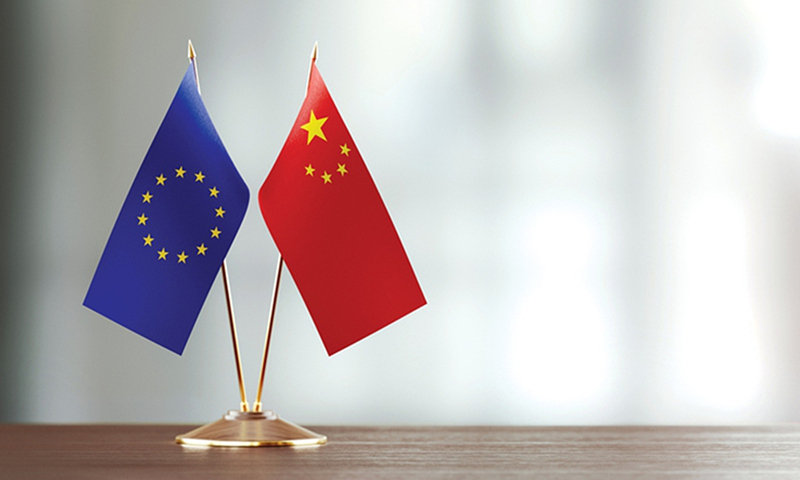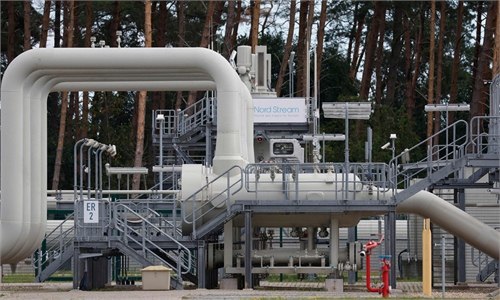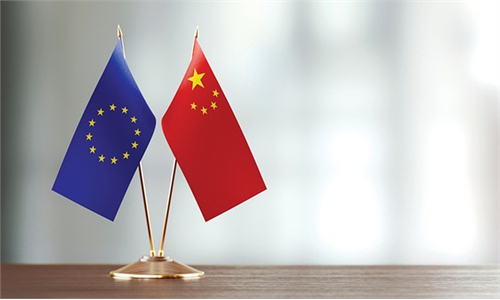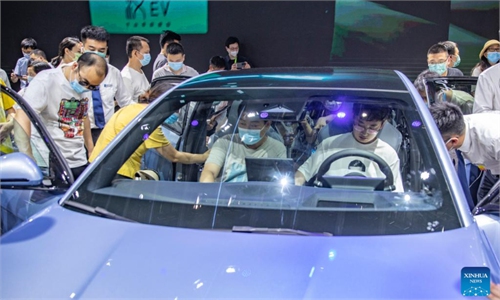EU chamber report's allegation of China losing business allure to European firms is 'untrue', laying bare their economic malaise: observer
EU chamber paper lays bare companies' own malaise: expert

China-EU Photo: VCG
The EU Chamber of Commerce in China (EUCCC) on Wednesday issued an annual position paper, alleging that China's standing as the promising investment destination has retreated and its central role in global supply chains is facing risks due to "the country's COVID-19 policy, dwindling diversity and increasing politicizing of business."
Experts said that the report, full of one-sided interpretations and distortions against the Chinese market, has laid bare the business malaise that the European companies have been increasingly grappling with due to unilateral Western sanctions. By passing the buck to China, they attempted to conceal their deep concerns over supply chain disruptions and capital flight from Europe.
The position paper has been issued at a time when some hardline German politicians are calling for a decoupling from the world's second-largest economy and the EU's largest trading partner, as well as Brussels - under the pressure of Washington - creates more discords in its relations with China.
However, the majority of European companies and observers have largely played down the possibility of any decoupling, citing mutually beneficial economic ties and the growing importance of Chinese products to the EU market in tamping down elevated inflation.
The position paper also advises the EU maintain a "flexible China strategy" and continue to push for deeper bilateral engagement, such as WTO reform and tackling the climate change.
According to the "European Business in China Position Paper 2022/2023," some European companies are now viewing China as "less predictable, reliable and efficient, and with geopolitical tensions on the rise, its future is less certain."
The paper abruptly jumped to the conclusion that China's pivotal role in global supply chains could be threatened amid intensifying debate on supply diversification, which was led by the US government.
EUCCC said it has seen European companies evaluating reshoring (relocating manufacturing back home), nearshoring (bringing manufacturing nearer to point of use), or friend-shoring (relocating manufacturing to country considered to be a trusted partner) as possible solutions.
Chinese observers said that the report is misplaced, by distorting the facts and badmouthing China's business environment, in order to justify European firms' internal business woes and lack of confidence in ensuring supply chain stability.
"Virtually all of the accusations in the report are groundless, disregarding how China has been acting as the 'anchor' in global supply chains and China's continuous efforts to open up its economy. European enterprises must realize that China does not create any difficulty for European businesses, but the politicians in the US and the EU do," Hu Qimu, deputy secretary general of digital-real economies integration forum 50, told the Global Times on Wednesday.
According to Hu, the cost of manufacturing in the EU has skyrocketed to an unbearable level as a result of stubbornly high inflation - on the heels of the US' irresponsible excessive money printing - and rising energy costs amid sanctions the West imposed on Russian energy products, which will make the importance of Chinese supply chains ascend to an unprecedented position.
Jörg Wuttke, president of EUCCC, told the Global Times on Wednesday that Chinese exports have indeed helped tame inflation in Europe, while extending his hope that Chinese imports from Europe could rise further.
In the first eight months, Europe remained the second-largest trading partner of China, with bilateral trade up 9.5 percent year-on-year, official data showed.
In response to the chamber's report, China's Foreign Ministry spokesperson Wang Wenbin said at a regular press briefing on Wednesday that in the first eight months, European countries were among the fastest-growing sources of FDI in China.
From January to August, China's actual use of foreign capital rose 20.2 percent year-on-year in US dollar terms to $138.41 billion, with investment from Germany climbing 30.3 percent, the second fastest in terms of growth, official data showed.
"China has coordinated epidemic prevention and socioe-conomic development against the backdrop of COVID-19 flare-ups and the global economic contraction. It has taken the lead to achieve positive economic expansion among major global economies, guaranteeing normal operation of foreign businesses in China," Wang said, adding that China's anti-virus measures are the most cost-effective ones.
Also, the country's higher level of openness, as well as a market-oriented, law-based and business friendly environment will bring abundant development opportunities to all firms, including European ones, and will provide new room for China-EU business cooperation, Wang said, urging relevant European parties to provide an open, transparent and non-discriminatory business environment for Chinese companies as well.
Relations between China and Europe endured some bumps in recent months, amid the latter's so-called decoupling attempts.
According to a Reuters report in early September, Germany's economy ministry is considering a range of measures to reduce German companies' reliance on China.
Many European companies have deemed such rhetoric far from real action. Even the EUCCC report suggested that "continued EU-China engagement is vital because there are still numerous shared challenges and many areas on which bilateral cooperation can deepen," including WTO reform, international standardization and working together to define a practical COVID-19 exit strategy.
And, there is enormous scope for China and the EU to cooperate on tackling climate change, the report said.



